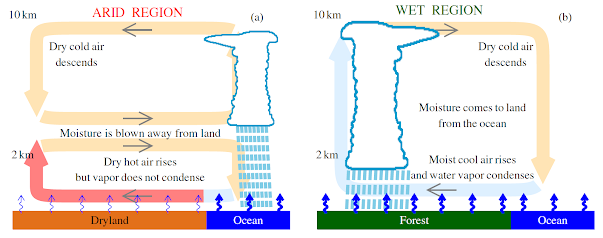Featured Post
Holobionts: a new Paradigm to Understand the Role of Humankind in the Ecosystem
You are a holobiont, I am a holobiont, we are all holobionts. "Holobiont" means, literally, "whole living creature." It ...
Thursday, August 4, 2022
Forests: do they cool Earth, or do they warm it? A comment by Anastassia Makarieva
Sunday, December 12, 2021
Anastassia Makarieva: Biotic Regulation in Florence
We had the pleasure of a visit to Florence of Anastassia Makarieva, one of the world's most creative and brilliant scientists in the field of ecosystems. Anastassia, together with Viktor Gorshkov, is the originator of the concepts of "biotic regulation" and "biotic pump" -- both fundamental in our understanding of the functioning of the ecosphere. Together, they mean that the current climate change is only in part the direct consequence of the increase in greenhouse gas emissions, but in significant part the result of the human perturbation of the ecosystem, and in particular the destruction of the old-growth forests.
So, Anastassia carries a message: it is vital for the planet to keep forests alive and in their pristine state. And that means just what the word says: forests, not just trees. Those politicians who compete for who plants more trees are just doing greenwashing. They may be harming the planetary ecosystem more than helping it. A tree, alone or as part of a plantation, does not have the same balancing effect and water carrying system that a forest has. A message that's not easy to understand for the current generation of decision-makers, used to the concept that a tree is worth only what profit it can provide once it is cut and sold on the market. Nevertheless, we must try to pass this message.
For Anastassia's talk in Florence, we experimented with a new format of presentation. To have Anastassia give an "official" talk, I should have gone through I don't even know what mass of paperwork, and then her talk would have been attended only by the few academics who still have some interest in creative research. All that in a super-safe, soulless room. The university, nowadays, has become something like Dracula's castle, with the difference that it is a scary place even in the daytime.
To say that these official seminars can be disappointing is an understatement. A few years ago I organized a talk by a Russian scientist on the question of the supply of gas from Russia to Europe. You would think it is an interesting subject. Well, the attendees were exactly zero, besides me, the sponsor of the talk, and the Russian scientist herself. And at that time there was no Covid yet to make people afraid even of their shadows.
So, this time we decided to play it differently: a colleague of mine kindly offered her living room to host Anastassia's seminar and we announced it on the social channels in addition to the regular university channels. We also offered drinks and snacks. We didn't know what to expect and we had no idea of how many people would bother taking a trip to the hills near Florence to listen to a Russian researcher speaking in English about her research.
It was a remarkable success. Not a big crowd, but we collected about 25 persons, of whom only 3 were professional scientists (I think they were those who would have shown up had we organized the talk in the university). And they all listened with extreme interest to Anastassia's talk, fascinated by the story of how the ecosphere stabilizes climate and how the forest's biotic pump creates wind and rain. When it was the time of telling the story of how Anastassia and Viktor survived for months in the boreal forests in a tent, with bears strolling nearby, the audience was completely captivated. The informal party after the seminar was an occasion to build up friendship among people who share the same views of the world, even though they are not necessarily scientists.
There is something to learn, here. Science is not a Moloch to worship, nor a dictator to be obeyed. And it is not even a conventicle of hyperspecialists who know so much about so little that they can be said to know everything about nothing. Science is one of the several possible embodiments of the concept of "philosophy," the love of knowledge. It is something that does not belong to anybody, it belongs to everybody. And that was clear at Anastassia's talk.
h/t Benedetta Treves and all those who helped organize this seminar. To know more about the biotic pump and biotic regulation, see the site https://bioticregulation.ru/



